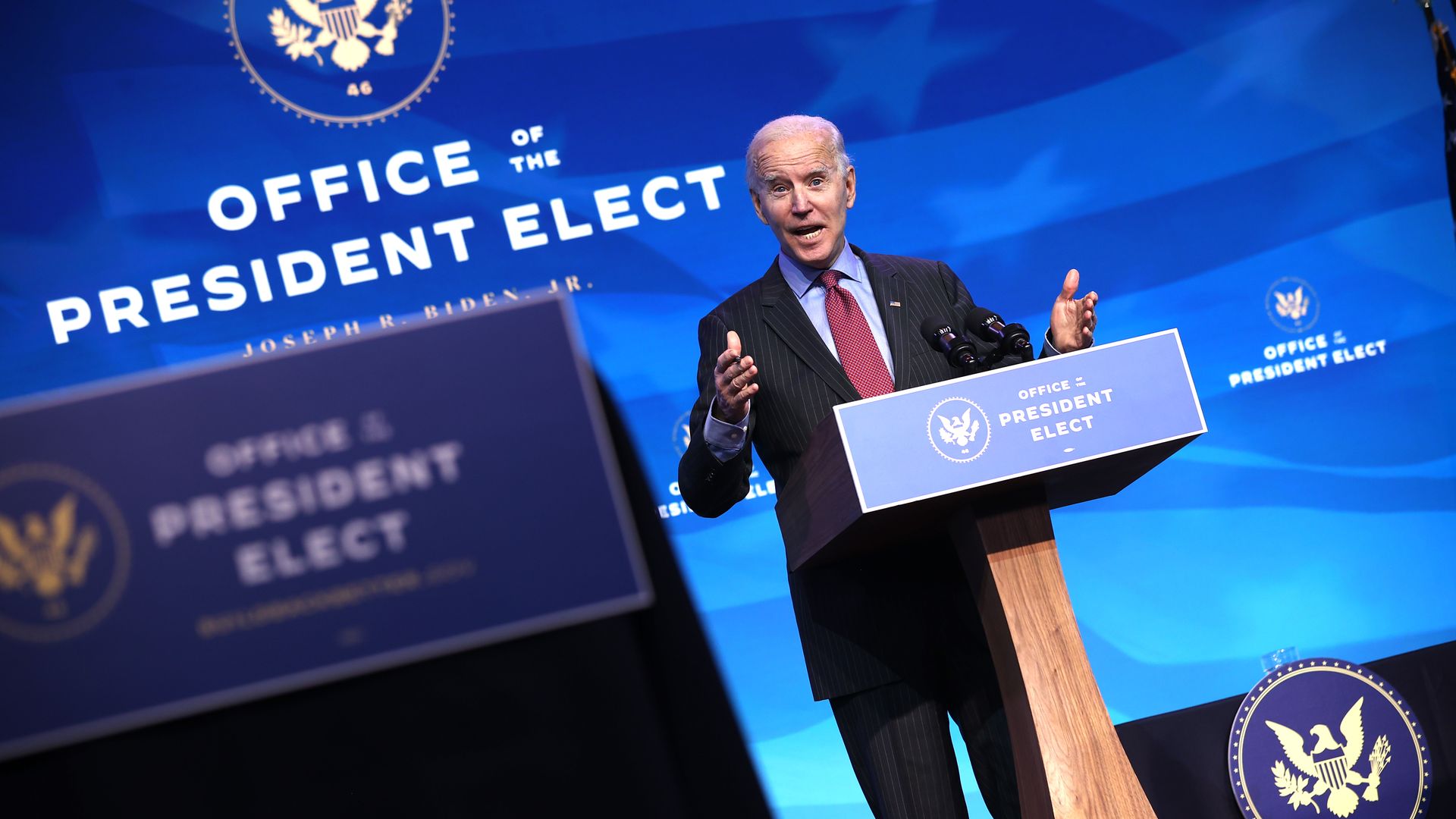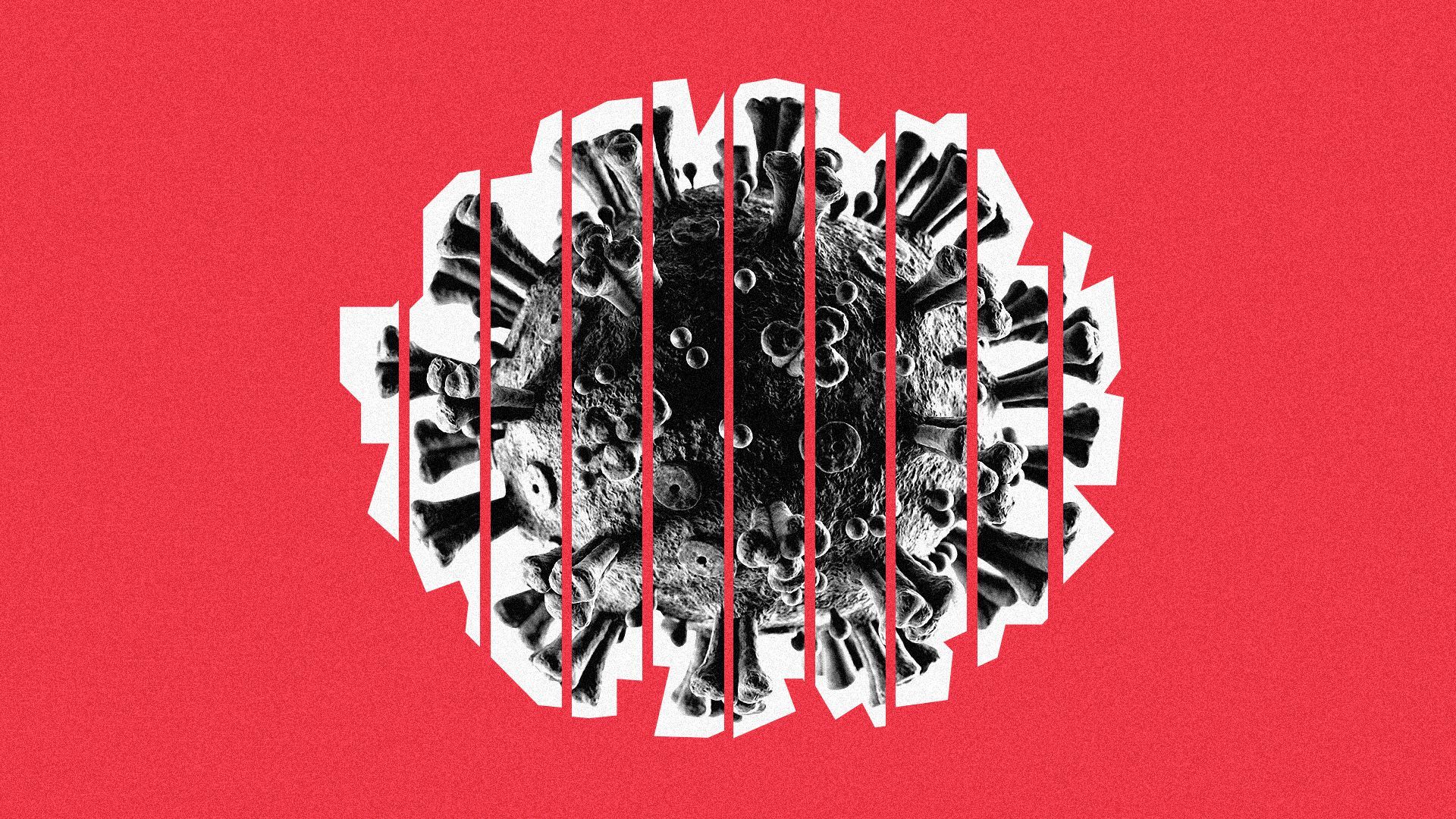| | | | | | | Presented By Partnership for America's Health Care Future | | | | Vitals | | By Caitlin Owens ·Jan 11, 2021 | | Good morning. Today's word count is 819, or a 3-minute read. | | | | | | 1 big thing: Biden's plan to shake up vaccine distribution |  | | | President-elect Joe Biden. Photo: Chip Somodevilla/Getty Images | | | | President-elect Joe Biden said on Friday that when he takes office, he'll release nearly all available coronavirus vaccines for distribution, instead of holding some back for second doses. Why it matters: This could help more people get a first dose of the vaccine sooner, and a person familiar with the administration's planning told WSJ that the decision won't change the timing between doses. - But there's no guarantee that the policy won't delay second doses.
- "The only risk is the second dose could be delayed a few weeks," said former FDA commissioner Scott Gottlieb, adding that the risk is small and he believes we should stick to the existing two-dose schedule. "I don't know that you need to distribute everything, but you don't need to stockpile 55%."
The big picture: The argument for releasing all available doses immediately is simple: The virus is spreading — and killing — at an unprecedented rate across the U.S., and giving more people some protection could save lives in the immediate term. - While delayed second doses would be an unintentional result of the Biden policy, some countries, including the U.K., have decided to intentionally delay second doses to stretch supplies.
The other side: The available vaccines have only been tested with second doses administered either three or four weeks after the first, and it's unknown how well alternative strategies work. - Some experts also question whether sending out more doses will solve the current distribution problems.
- Making dosage changes isn't justified "both because it's not supported by the data that we do have, and because it doesn't address the actual problem currently facing the UK, the US, and Canada, which is the distribution of existing supplies," Georgetown's Angela Rasmussen and the University of Alberta's Ilan Schwartz write in The Guardian.
|     | | | | | | 2. Colleges embrace on-campus classes |  | | | Illustration: Sarah Grillo/Axios | | | | Many colleges will bring students back to campus for the spring semester, with or without widespread vaccination, Axios' Marisa Fernandez reports. Why it matters: Several colleges that reopened campuses in the fall were tied to big outbreaks. But schools say they've learned from that experience and improved their safety protocols, and are now confident that they can manage fuller campuses. Driving the news: Only about 35% of colleges — including both public and private institutions — will be fully or primarily online this semester, said Chris Marsicano, executive director of the College Crisis Initiative at Davidson College. - Brown University will roughly triple the number of students in campus housing, the Brown Daily Herald reports. And Harvard University will nearly double its capacity, to 3,100 individual student bedrooms.
Where it stands: Schools are implementing more rigorous safety measures, or modifying their operations, in the hopes of avoiding more outbreaks. - The University of North Carolina system recently announced that students will be required to get tested before they return to campus for the spring.
The other side: Pennsylvania State University will start the spring semester online because of "extensive analysis and scenario planning given worsening virus conditions nationally and across the state indicating predictions of rising hospitalization rates in the coming weeks," the university announced Friday. The bottom line: Most colleges students will not be eligible for the vaccine during spring semester, and will need serious testing efforts and social discipline to keep outbreaks from occurring. Go deeper. |     | | | | | | 3. One more big Medicaid waiver approval | | CMS administrator Seema Verma has been working steadily for four years to restructure the Medicaid program — and Friday's approval of a block grant proposal in Tennessee was one last, big parting shot, Axios' Sam Baker writes. The big picture: Medicaid waivers — most notably, waivers allowing states to impose work requirements in their Medicaid programs — have been the most focused, most significant part of the Trump administration's health care legacy. - And the waiver approved on Friday, allowing Tennessee to convert its Medicaid into a system of block grants for 10 years, would be the biggest change yet.
Yes, but: The Biden administration will be able to undo the waiver approval, as The Tennessean notes, and Medicaid work requirements have suffered consistent losses in the courts. |     | | | | | | A message from Partnership for America's Health Care Future | | Working together to defeat and overcome COVID-19 | | |  | | | | Americans are relying on our health care system now more than ever to provide the health coverage and care they need. That's why America's health care leaders are stepping up and working together to defeat and overcome COVID-19. Learn more. | | | | | | 4. More evidence of long-term coronavirus symptoms | | A new study of coronavirus patients discharged from a hospital in Wuhan, China, found that most participants had at least one symptom six months later, the New York Times reports. Why it matters: The study, published in The Lancet, is a stark reminder that death isn't the only thing to fear from the virus. Details: Of the 1,733 patients included in the study, more than three-quarters of them had lingering symptoms, including fatigue, insomnia, depression, anxiety or diminished lung function. - Exhaustion or muscle weakness was the most common ongoing issue.
- Although the patients were sick enough to be hospitalized, the vast majority did not need ventilators or high-flow nasal oxygen, meaning they weren't the most severely ill patients.
|     | | | | | | 5. Catch up quick |  | | | Illustration: Aïda Amer/Axios | | | | The U.S. Capitol's attending physician reportedly warned lawmakers on Sunday that they may have been exposed to someone with a coronavirus infection as they hid from a pro-Trump mob breaching the building on Wednesday. Mike Bloomberg is staging a global competition that asks mayors to describe nimble responses to the pandemic in their cities, with 15 winners receiving $1 million grants, Axios' Jennifer Kingson reports. Pfizer and BioNTech said on Friday that their coronavirus vaccine is effective in one of the mutations present in the new variants spreading in Britain and South Africa, per NYT. The Blue Cross Blue Shield Association announced that it was suspending political contributions to members of Congress that voted against accepting the Electoral College results last week. |     | | | | | | A message from Partnership for America's Health Care Future | | Working together to defeat and overcome COVID-19 | | |  | | | | America's leading doctors, nurses, clinicians, hospitals, health insurance providers, biopharmaceutical companies and employers are committed to working together to defeat and overcome the COVID-19 crisis by helping Americans get healthy and stay healthy. | | | | | | Axios thanks our partners for supporting our newsletters.
Sponsorship has no influence on editorial content. Axios, 3100 Clarendon Blvd, Suite 1300, Arlington VA 22201 | | | You received this email because you signed up for newsletters from Axios.
Change your preferences or unsubscribe here. | | | Was this email forwarded to you?
Sign up now to get Axios in your inbox. | | | | Follow Axios on social media:    | | | | | |







No comments:
Post a Comment